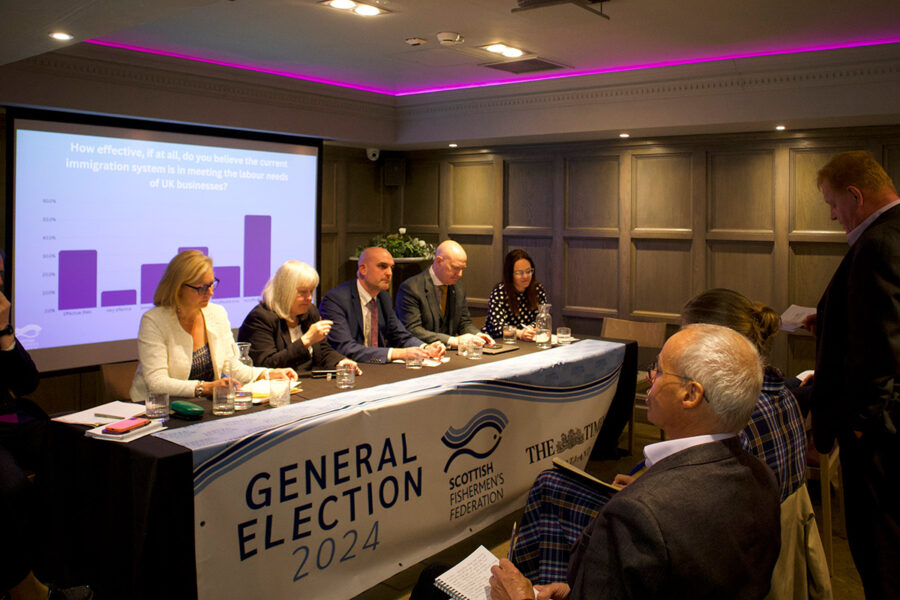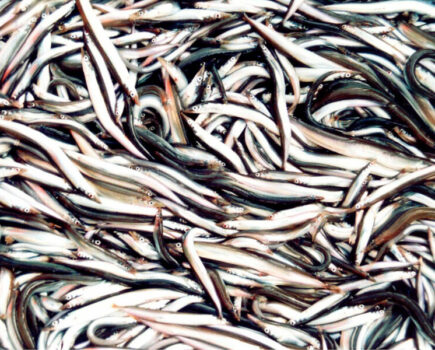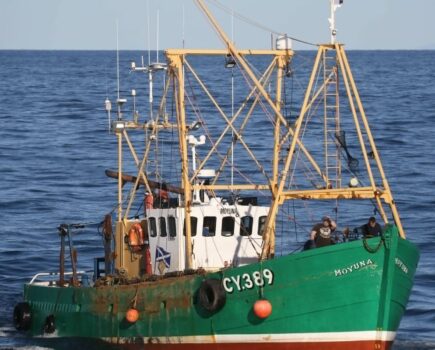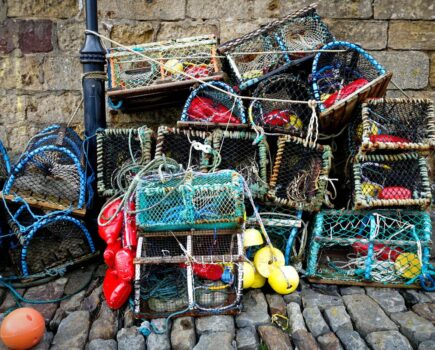Held a stone’s throw from Holyrood, the hustings organised by the SFF last week provided an opportunity to ask Scotland’s political parties about issues where Westminster retains powers, and hear them spell out what their parties would do to support Scottish and UK fisheries if elected to power on 4 July.
With Orkney and Shetland MP Alistair Carmichael fog-bound in Lerwick, only one sitting MP, Alba’s Neil Hanvey, whose constituency includes Kirkcaldy, was present, with MSPs sitting in for the other parties. The Scottish Greens, who had been invited, failed to show at all.
With five candidates and a host of questions from SFF members attending the Q and A session, moderated by Keiran Andrews of the Times, the event needed to move at speed.
Ian Gatt, chief executive of the Scottish Pelagic Fishermen’s Association, kicked off. Referencing previous political assurances about taking ‘full control’ of UK waters, he asked candidates what their parties would do increase control of UK waters. Hannah Fennell, SFF president and head of Orkney Fisheries Association, asked a related question about future relationships with the EU on fisheries issues.
The message from all the politicians present was a stark one: full control, in every aspect, wasn’t a realistic outcome, and despite promises in the past, never had been. The best that could be hoped for, candidates agreed, would be improving on the current situation.
Representing the SNP, deputy first minister Kate Forbes said that the current arrangement with the EU ‘is the worst of both worlds’. “I recognise this challenge for the fishing industry, which has been forgotten after the debate and vote.”
The answer, she suggested, wouldn’t be full control, but pushing for the Westminster government to regain lost opportunities for the industry, including freer trading arrangements for fisheries products into the EU and restoring freedom of movement in a way that is tailored to the needs of fishing businesses for more labour.
Alba suggested that the European Free Trade Agreement would provide the trade benefits that Scottish fishing needs, whilst retaining UK sovereignty over fish stocks. The Brexit negotiations had, he said, been ‘deficient’, with a much more positive trade-off possible between retaining access to markets and controlling our own fish stocks.
“We also always knew it would come to this,” said Labour’s Rhoda Grant. “We had a loud voice in Europe – now we have none.” Labour, she said, would rebuild the relationship with the EU, an essential step to a wider review of how UK fisheries are managed, and how non-UK vessels access UK waters, whilst reducing red tape at the EU border.
Rachael Hamilton, for the Conservatives, said: “We all agree we can’t rewind the clock back to the Brexit agreement. We all want to achieve complete control of access to UK waters. We have, though, seen increased quotas, and had strong negotiations with Norway and the EU.” Revised access discussions, she suggested, should look at zonal attachment of stocks and use this as an argument for securing a better deal.
For the Lib Dems, Liam McArthur said that the current TCA was ‘sub-optimal, agreed by a prime minister with no interest in detail’. The next TCA had to be a priority for Westminster, which would require compromise, he said – but that compromise should not involve fishing being traded off for the benefit of agreement on other trade sectors.
In response to a question on issues around offshore energy and its impacts on the industry, the politicians provided very similar answers about the need for fishing to be at the top table at the earliest planning stages, and balancing the need for renewable energy with an industry that is part of the fabric of Scotland’s identity, as well as providing food security and rural employment.
Rhoda Grant said that it was important to identify, and protect, the most important fishing grounds from development, something ‘that did not happen prior to the HPMA fiasco’.
In response to a question about compensation, Kate Forbes said she much preferred a route where benefits of developments were conferred on impacted communities ‘in perpetuity, with arrangements that support communities, for example with lower power bills’, rather than one-off compensation payments.
In a UK election where in much of the rest of the country, immigration – and its reduction – is seen as a key issue, the answers from candidates about easing restrictions on foreign crew and seafood processing workers had a very Scottish flavour, unlikely to be heard at any hustings south of the border.
All candidates offered a measure of support for pilot schemes of some sort that would enable continued recruitment of foreign staff to fishing and seafood businesses. With widespread concerns about immigration elsewhere in the UK, such schemes could be tailored to the local situation in Scottish communities, with an acknowledgement that investment in local services and housing were also issues that required a fix, if long-term employment in key rural industries such as fishing is to be maintained.
Speaking to FN after the event, SFF chief executive Elspeth Macdonald said: “The hustings went very well – engaging and stimulating discussion, though no great surprises from any of the parties.
“It was encouraging, though, to hear that there seemed to be consensus around treating sectors impacted by offshore wind developments in a way more similar to those impacted by wind farms onshore, through properly designed community benefit. That’s something we will certainly want to explore further with governments north and south of the border. And of course we were pleased to hear all parties’ recognition of fishing as a vital part of our food production, both now and in the future.”
MCA: ‘Accountability is key’
In response to a question from FN about the continual concerns raised with us on MCA issues, and the fact that many in the industry see aspects of the agency’s work as out of control, only one speaker, Kate Forbes of the SNP, immediately grasped the impact that was being felt by her own constituents with respect to vessel surveys.
“This is a matter reserved to the UK government, where the Scottish government can take little action. I have several constituents who have raised with me the need for more accountability for the actions of the MCA, and the SNP will push for this as a strong voice in the next Westminster parliament.”
SNP MSP Karen Adam suggested that her own discussions with industry pointed to fishermen’s concerns being ‘more about the actions of Marine Scotland, than the MCA, and the lack of funds that Marine Scotland currently receives’. On MCA issues, it would be for MSPs to ‘talk with London colleagues’ about any issues arising, she said.
Liam McArthur of the Lib Dems said that ‘there are individuals within the MCA doing their best, often fighting their own systems’, but that, in the end, it was political accountability of the agency that was key.
This story was taken from the latest issue of Fishing News. For more up-to-date and in-depth reports on the UK and Irish commercial fishing sector, subscribe to Fishing News here or buy the latest single issue for just £3.30 here.
Sign up to Fishing News’ FREE e-newsletter here.








